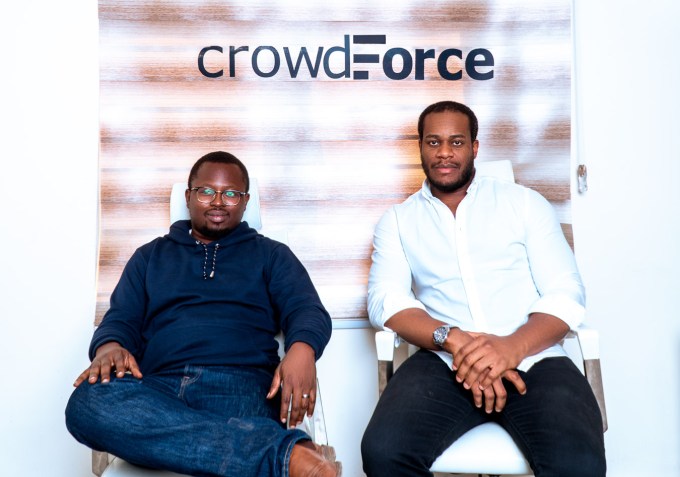Nigeria has an average of 4.8 bank branches and 19 ATMs per 100,000 adults, compared to the world average of 13 bank branches and 40 ATMs. Reports also say that less than one-third of Nigerian adults have access to a bank branch or ATM within one kilometer of where they live.
This challenge in accessing financial services, especially for the unbanked and underbanked, has given rise to agency banking. This branchless banking model extends financial services to the last mile via a network of agents. It’s a thriving business for banks, larger fintechs such as OPay and TeamApt, and even smaller ones like Abuja-based CrowdForce, who today is announcing that it has raised a $3.6 million pre-Series A investment.
Aruwa Capital Management led the equity-and-debt round, with participation from HAVAÍC and AAIC. The company said it will use part of the capital to expand its team, geographical operations and marketing to increase its 7,000-strong active agent network three-fold this year.
The company was launched in 2015 by Oluwatomi Ayorinde and Damilola Ayorinde as MobileForms, a data collection agent network. The concept was to capture and build reliable offline data (where 90% of the country’s economic activities reside) and provide insights on hard-to-reach rural and semi-urban areas for businesses, NGOs and development organizations.
In 2018, the company got its first big break while working on TraderMoni, a small loan scheme for micro traders pioneered by the Nigerian government. The idea was to give these traders repayable loans to help them with their businesses and bring them out of the poverty line. However, the challenge was that no database existed to execute this program.
So MobileForms, with its 20,000-strong agents, performed KYC on 4.5 million eligible traders and registered them for the TraderMoni program. But another challenge was getting money into the hands of these traders. Most of them were unbanked, so sending money to bank accounts wasn’t workable, and, for those with accounts, banks were far from their locations.
The company sensed an opportunity and decided to rebrand as CrowdForce, a financial services distribution network that can turn any merchant into a mobile bank branch.
“We thought that if we could build this successfully well, several other fintechs can layer to deliver their services to the mass markets and that will still be in line with our objective of building our distribution,” said CEO Oluwatomi Ayorinde. “When you look at most of the successful companies in Nigeria, they all had to build some sort of offline distribution.”

The YC-backed CrowdForce still runs its MobileForms products. But it’s PayForce, its second product, that the company has placed in the driving seat. PayForce is a POS-enabled system merchants — who double as agents — use to provide ATM services, transfer and bill payments to consumers in areas where banks are traditionally absent and with high cash demand. For agents, PayForce helps manage their cash float safely and allows them to earn extra income by acting as an agent.
But at some point, these agents’ liquidity is affected when they run out of cash. Liquidity becomes a problem when it happens often because there’s a tendency to lose customers’ trust.
So typically, how over 200,000 agents across Nigeria refinance their working capital is by taking long walks to the banks, from the fintechs they work for like TeamApt, or access loans from platforms such as Aella Credit. There are newer methods, such as the one brought on by another YC-backed float-as-a-service startup Moni, where agents are offered low-interest loans through a referral and vetting system.
But CrowdForce employs a different approach. The company strikes partnerships with larger brick-and-mortar businesses such as gas stations and turns them into mobile bank branches that offer float services while storing their cash on a PayForce digital wallet.
“These stations [gas stations] collect cash from their sales of petrol daily. But now, we can leverage that liquidity, turn them to mobile ATMs that can then provide liquidity either to customers or to other mini agency banking outlets,” said the CEO. “So if you run an agent network and run out of cash, you don’t necessarily need only a bank branch. You can look for a gas station nearby and replenish cash flow.”
In addition to gas stations, CrowdForce distributes its POS terminals to other businesses like pharmacies and reseller networks. The company said it has partnered with 19,000 fuel stations, 20,0000 resellers and 6,000 pharmacies to broaden its distribution network. With this model, CrowdForce claims to have the largest liquidity among Nigerian agent banking networks, leveraging more than ₦1.7 trillion via its partners.
The Nigerian agency banking company charges a 0.6% commission per transaction its partners make across all boards. CrowdForce says it has been cash positive since 2020 while growing 25% month-on-month to serve 1.9 million unique customers in 25 Nigerian states to date.
Ayorinde said CrowdForce will use the funding to distribute more point of sale terminals to its partners in the next 12 to 18 months as the company, in a statement, said it aims to bring financial services within one kilometer, or within 15 minutes, of all Nigerians.
“We see significant value in the product [CrowdForce] as it is solving a real problem by providing access to critical financial services in rural areas that have been overlooked by traditional financial institutions,” said Aruwa Capital founder and managing partner Adesuwa Okunbo Rhodes in a statement. “CrowdForce is actively deepening financial inclusion through its products and services, and has unique competitive advantages through its proprietary technology and extensive agent distribution network across the country.”































Comment